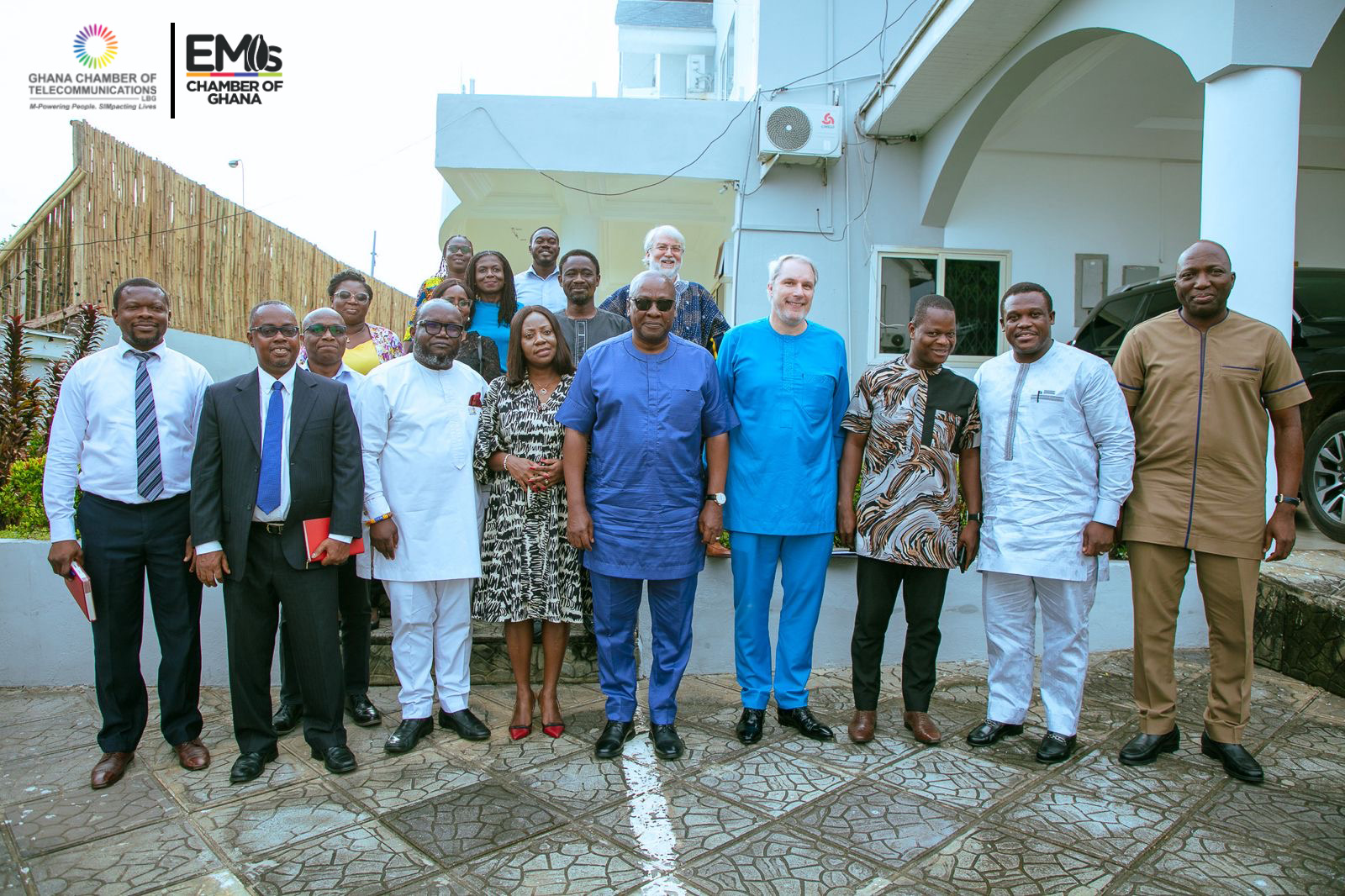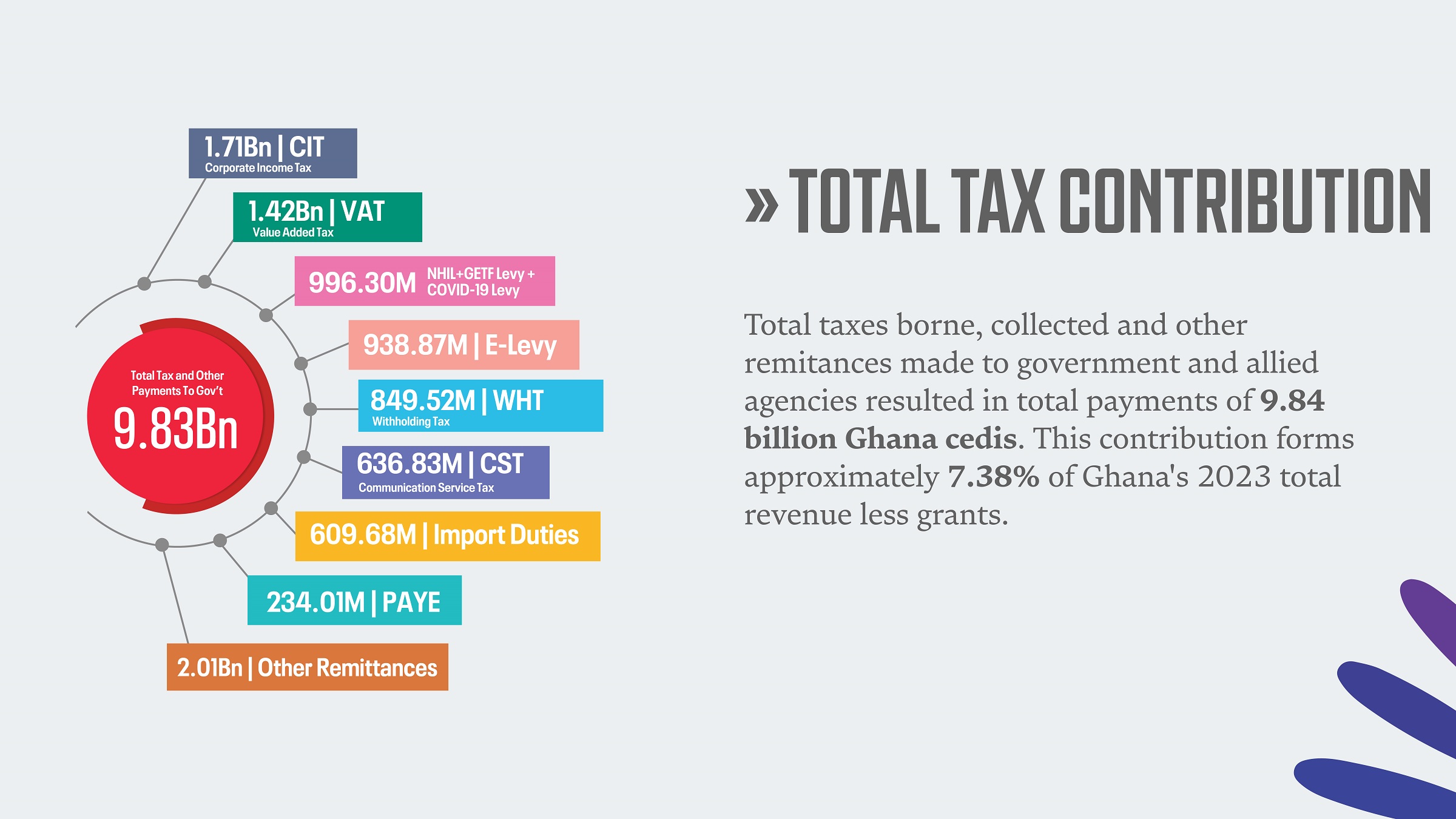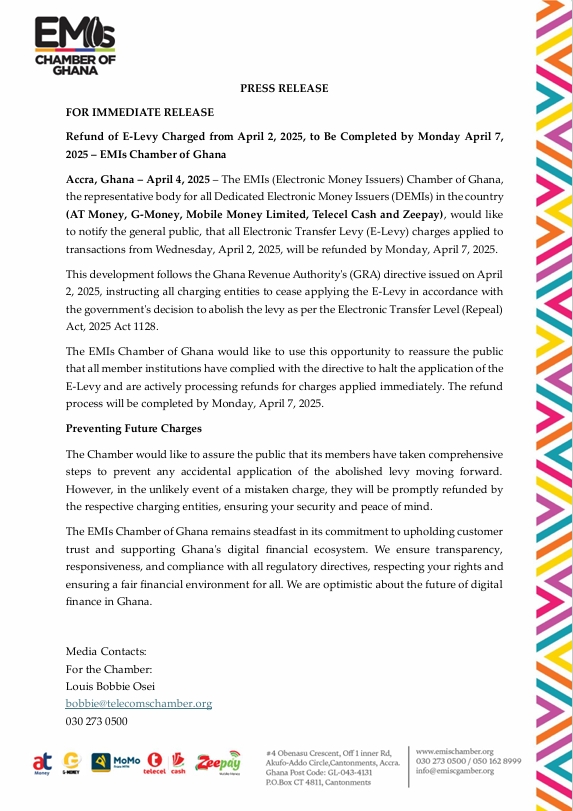
EMIs Chamber of Ghana Congratulates Dr. Johnson Asiamah on His Nomination as BoG Governor

The EMIs Chamber of Ghana, the leading advocacy body for digital financial ecosystem, extends its warmest congratulations to Dr. Johnson Asiamah on his nomination as the next Governor of the Bank of Ghana. His extensive experience in monetary policy, financial stability, and economic research makes him well-positioned to steer Ghana’s financial sector towards greater innovation and inclusion.
As we look forward to Dr. Asiamah’s tenure, the Chamber remains committed to working closely with the Bank of Ghana to further strengthen Ghana’s digital financial ecosystem, ensuring continued innovation, consumer protection, and financial inclusion for all Ghanaians.
As captured in the release announcing his nomination, Dr. Asiamah’s nomination follows the acceptance of a formal request by the current Governor, Dr. Ernest Addison, to proceed on leave ahead of his retirement on March 31, 2025.
With over 23 years of experience at the Bank of Ghana, Dr. Asiamah brings a wealth of expertise in monetary policy, financial stability regulation, and economic research. He previously served as Second Deputy Governor of the Bank of Ghana from 2016 to 2017 and holds a PhD in Economics from the University of Southampton, UK.
We also take this opportunity to commend Dr. Ernest Addison, the outgoing Governor, for his invaluable contributions to the country’s digital financial ecosystem. Under his leadership, the Bank of Ghana championed progressive regulatory frameworks that have significantly advanced financial inclusion and the growth of electronic money institutions.
Congratulations once again to Dr. Johnson Asiamah, and best wishes to Dr. Ernest Addison on his next chapter.
Full release below:
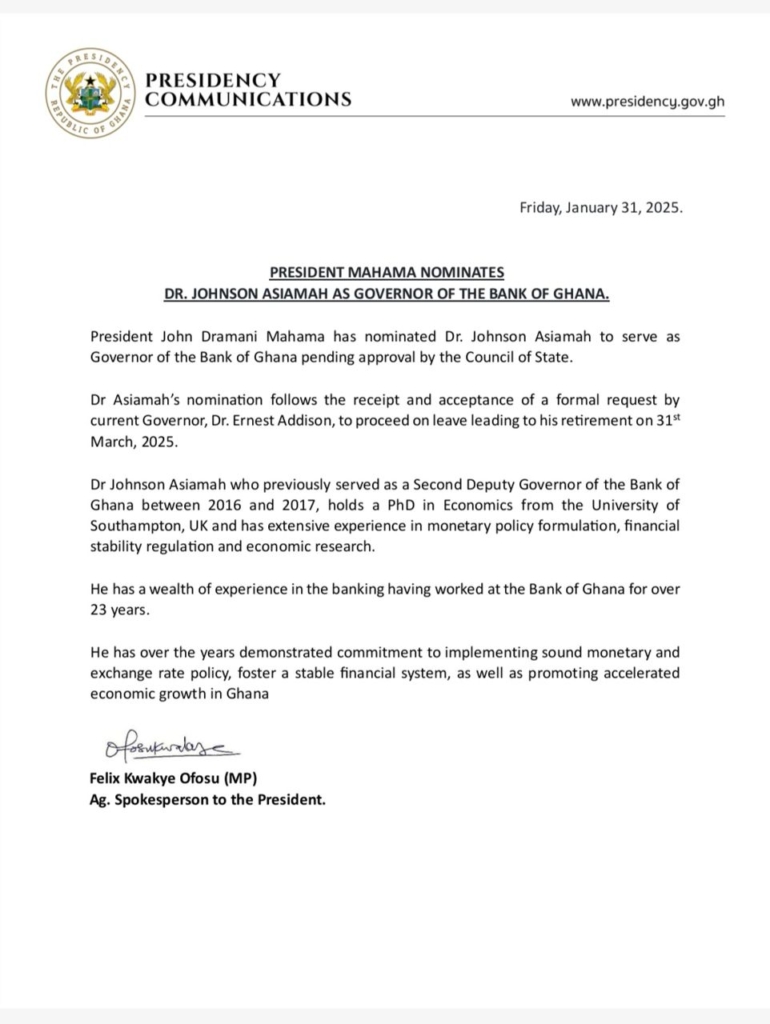
MoMAG Congratulates Hon. Atto Forson
FOR IMMEDIATE RELEASE
CONGRATULATORY MESSAGE TO THE PRESIDENT-ELECT OF THE REPUBLIC OF GHANA, JOHN DRAMANI MAHAMA
Accra, Ghana – December 10, 2024: On behalf of the Ghana Chamber of Telecommunications and the EMIs Chamber of Ghana, we extend our heartfelt congratulations to His Excellency John Dramani Mahama on his election as President of the Republic of Ghana.
The re-election of His Excellency John Dramani Mahama signifies a pivotal moment for Ghana as the nation continues to strengthen its democratic institutions and advance its socio-economic development. As key stakeholders in Ghana’s telecommunications and electronic payments industries, we commend his steadfast commitment to innovation, inclusivity, and technological advancement. His leadership is crucial in our mission to drive digital transformation in Ghana. We anticipate working with your government on your manifesto initiatives, including those captured under Digital Economy, Communication, and Innovation.
We intensely appreciate your Excellency for honouring the invitation of our two Chambers to deliberate on our manifestos and explore ways to build our industries. Your commitment to our mission is deeply appreciated.
Let us also use this opportunity to commend the Vice President of Ghana, His Excellency Dr. Mahamudu Bawumia, for prioritizing the nation’s interests by graciously accepting the election results and congratulating the President-elect, reinforcing Ghana’s strong democratic values. Additionally, we extend our heartfelt appreciation to the people of Ghana for ensuring the elections were conducted peacefully and orderly.
To the President-elect, we are optimistic about the future of our collaboration with your administration to enhance further Ghana’s position as a leader in digital inclusion, financial technology, and connectivity across Africa. Together, we will work to ensure that our collective efforts foster economic growth, create opportunities for Ghanaians, and build a sustainable digital ecosystem for future generations.
Long Live Ghana! Long Live Innovation and Progress!
Signed
Ing. Dr. Kenneth Ashigbey
CEO – Ghana Chamber of Telecommunications
CEO – EMIs Chamber of Ghana
About the Ghana Chamber of Telecommunications & EMIs Chamber of Ghana
The Ghana Chamber of Telecommunications is the foremost industry association representing the interests of telecommunication operators and infrastructure companies in Ghana. The Chamber is deeply dedicated to promoting and advancing the growth of the telecommunications industry, ensuring the delivery of high-quality services to consumers, and supporting the country’s socio-economic development.
The EMIs Chamber of Ghana is the unified voice for Ghana’s digital finance ecosystem. We proudly represent the leading digital finance entities AT Money, G-Money, Mobile Money Limited, Telecel Cash, and Zeepay Mobile Money. We are unwavering in our commitment to fostering innovation, enhancing regulatory collaboration, and supporting the growth and sustainability of the digital finance sector in Ghana. We aim to create a thriving and inclusive financial landscape that benefits all Ghanaians through advocacy and research.
Media Contact:
For the Chamber:
Louis Bobbie Osei
0302730500
Promoting Peaceful Elections for a Stable Financial Ecosystem
Telecom Industry contribution to government rises to GHS 9.8 billion in 2023
The total contribution of the telecommunications industry by way of taxes, fees, levies, and other payments to government in 2023, has risen by more than 30%. The industry’s overall taxes and other payments to the government in 2023 rose to GHS 9.84 billion, up from GHS 7.32 billion in 2022.
This was made known by the Chief Executive Officer of the Ghana Chamber of Telecommunications (GCT) and the EMIs Chamber of Ghana, Ing. Dr. Kenneth Ashigbey during the launch of the 2023 Mobile Industry Transparency Initiative Report in Accra. The event was well attended by representatives of members of both Chambers, members of the media, and external validators including Mr. William Demitia, a law lecturer at the University of Ghana and Mr. Gordon Dardey, Partner at KPMG.
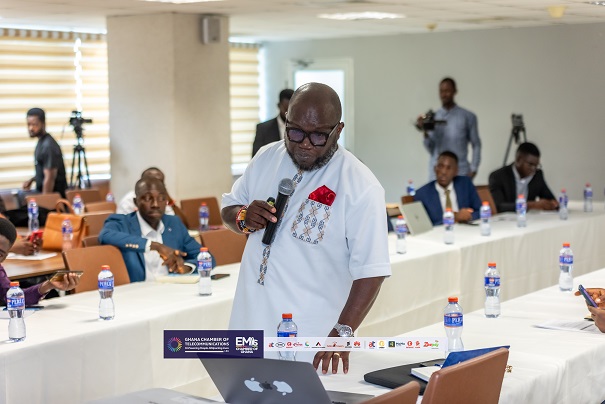

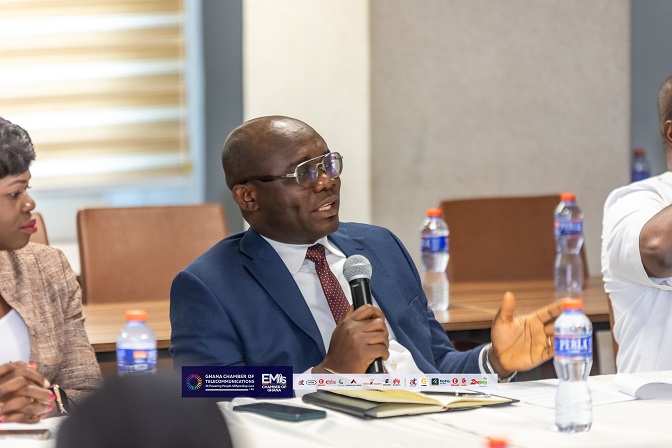
The annual report, based on data from members of the Ghana Chamber of Telecommunications including AT, MTN, Vodafone, ATC, Helios, Comsys, CSquared, Ericsson, and Huawei, and members of the EMIs Chamber of Ghana including AT Money, G-Money, Mobile Money Limited, Telecel Cash and Zeepay, aims to illustrate the industry’s societal and economic contributions to the country’s development.
During his presentation, Dr. Ing. Kenneth Ashigbey, revealed that the industry’s tax contribution and other payments span various categories, including Corporate Income Tax (CIT), Value Added Tax (VAT), Communication Service Tax (CST), Import Duties and the E-levy, among others. The CIT alone contributed GHS 1.71 billion, while VAT and CST amounted to GHS 1.42 billion and GHS 636.83 million respectively. Additionally, import duties and other remittances formed a substantial part of the total tax payments.
This extensive contribution according to Dr. Ashigbey underscores the industry’s commitment to Ghana’s economic progress. Beyond taxes, the telecom sector is pivotal in driving socio-economic development. With approximately 35 million mobile connections in Ghana, mobile penetration boosts jobs, productivity, and financial inclusion. Mobile money, for instance, has made financial services accessible to the unbanked, particularly benefitting micro, small, and medium-sized enterprises (MSMEs).
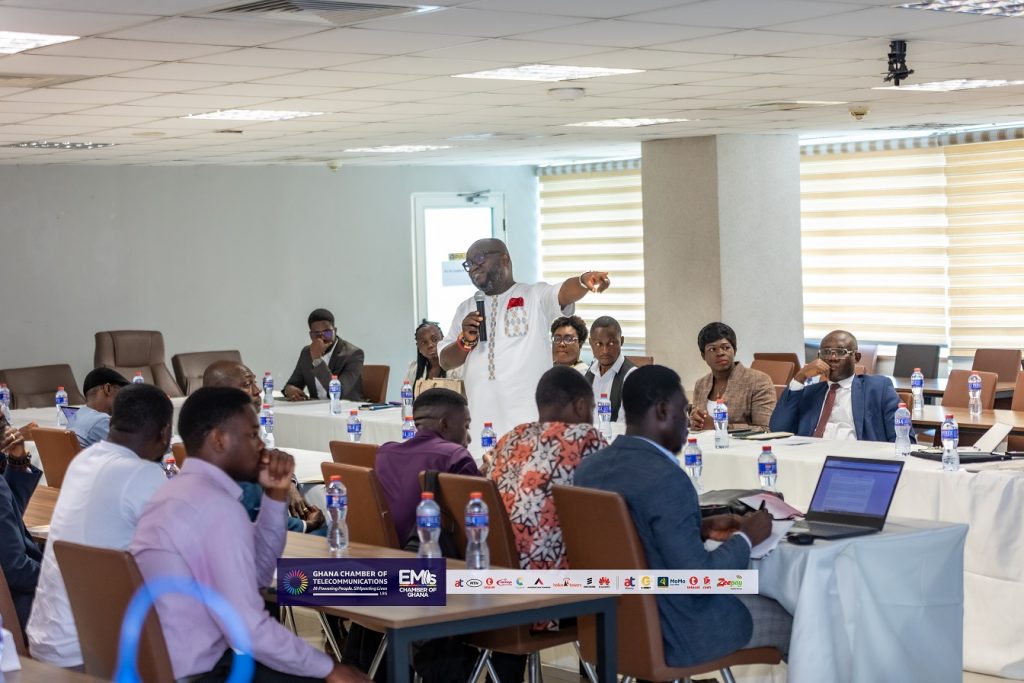
The report also highlighted the industry’s contributions to employment, with over 5,800 direct and indirect jobs (not counting the jobs created for mobile money agents and others). The industry also demonstrated a strong commitment to corporate social responsibility, investing millions into social initiatives across the country.
These contributions showcase the ongoing efforts of the telecom industry to align with government revenue goals, support national development, and bridge the digital divide in Ghana.
Methodology
The study employed the Total Contribution methodology, encompassing both tax and non-tax contributions made by GCT members as well as members of the EMIs Chamber to government.
Tax contribution breakdown
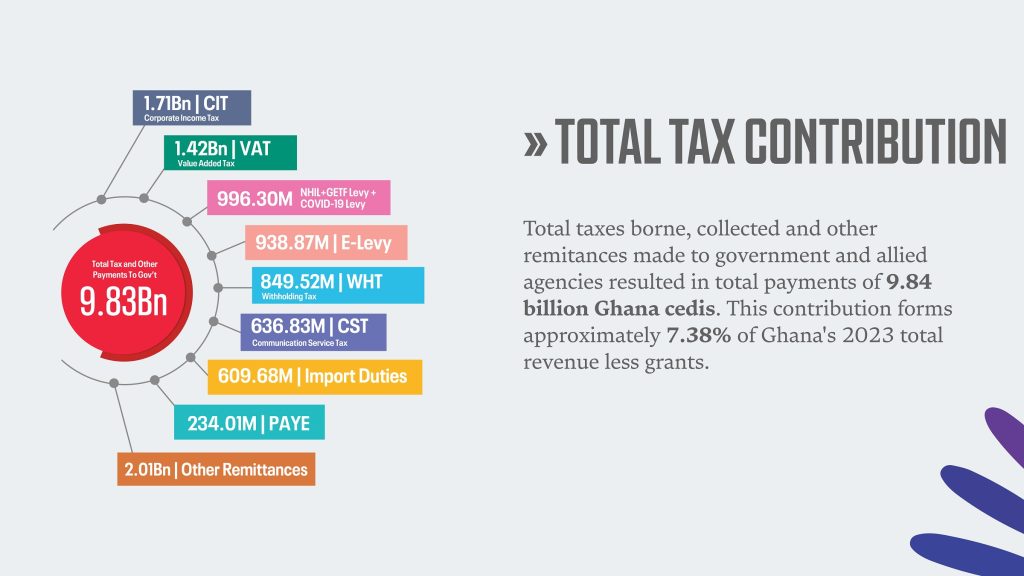
Corporate Income Tax (CIT) jumps from GHS 1.35 bn to 1.71bn
The breakdown of tax contributions included Corporate Income Tax (CIT), increased from million to GHS 1.35 billion in 2022 to GHS 1.71 billion, accounting for a significant rise of approximately 26.62%
VAT grows from GHS 930 m to GHS 1.42 bn
Value Added Tax (VAT) surged from GHS 930 million to GHS 1.42 billion, marking it as the second most significant tax category for the industry after Corporate Income Tax (CIT). The report shared by the Chamber demonstrated a notable increase of 52.04 % in VAT in 2023.
Withholding Tax jump to GHS 849.5 bn in 2023
Withholding Tax (WHT) continued to grow in 2023 like it did in 2022. WHT rose from GHS 699.25 million in 2022 to approximately GHS 849.52 in 2023, indicating an increase of about 21%. The continued rise can be attributed to escalating business costs and increased spending, impacting the overall industry value chain.
Communications Service Tax (CST)
Proceeds from the Communications Service Tax (CST) rose by 25% in 2023, from a figure of GHS 509.46 million in 2022 to GHS 636.83 million in 2023. This industry specific tax continues to put a damper on the potential volume growth and affects the affordability of data and voice for the Ghanaian subscriber. We would continue to propose that the rate of CST should be reduced in the near term or scrapped entirely.
GHS 2.01bn in other remittances
The report further highlighted that; other remittances collectively contributed GHS 2.01 billion in 2023. Other Remittances jumped because of surcharge on international inbound call termination (SIIT). Though in USD terms the amount it increased by just 1%, in cedi terms it increased significantly by more.
Import Duties rise from GHS 330.9 m in 2022 to GHS 609.7 in 2023
Import duty collections in 2023 stood at GHS 609.68 million. This rise can be attributed to among other things the significant depreciation of the Ghana Cedi against its major trading partners in 2023. As highlighted in the previous edition of this report, there’s a pressing need to focus efforts on developing and implementing local solutions that alleviate pressure on the local currency. Additionally, we propose that government considers waiving some import duties and taxes on some critical telecommunications equipment that are very important for the country’s development. This should also include components for the provision of solar energy other than the panels that are currently exempt.
Pay as You Earn
The report’s analysis revealed a significant growth in the Pay as You Earn (PAYE) tax line, inching up from GHS 167.2 million in 2022 to GHS 234.01 million in 2023 marking a 39.95% increase. This demonstrates not only the growth in payments made to our direct employees but also the numbers employed within an environment where unemployment is a critical national challenge. This is one of the reasons why the government should consider easing the fiscal burden on the industry to enable it further expand its employment capacity.
E-Levy increases by 93.8%
Electronic Transfer Levy (E-Levy) collected in 2023 stood at GHS 938.87 million, a rise of about 94% from the GHS 484.5% paid by the industry in 2022. The reduction in the E-Levy rate has resulted in some recovery in the volumes and values. But there is the need for further revision in this policy to align it to government’s digital by default strategy.
An Industry Poised for Growth with Tax Reforms
Beyond the numbers highlighted above, the telecom industry has positioned itself as the horse pulling the economic cart up the hill, making invaluable contributions to the digital transformation and connectivity needs of Ghana.
As a driver of economic progress, the telecom industry holds the potential to bring more people into the formal economy, particularly in the informal sector, which is traditionally outside the tax net. Through innovations in mobile money, data services, and digital platforms, telecom companies can facilitate the tracking of transactions and financial flows within the informal sector, creating an opportunity for the government to expand its tax base. By working closely with the telecom industry, the government can develop policies and systems that encourage the registration and taxation of informal businesses, thereby boosting national revenue. This partnership can create a win-win situation, where the informal sector benefits from access to digital financial tools and the government increases its revenue from a broader tax base.
Additionally, the government can play its part in supporting the telecom industry by reconsidering the current taxes (especially industry specific ones) and rates. A more extensive tax base with fair rates could ultimately foster a more sustainable and inclusive economy, as businesses of all sizes would feel more inclined to operate within the formal economy, knowing that their contributions are fairly assessed.
In summary, the telecom industry’s growth is not just about revenue; it is about creating a more inclusive, connected, and robust economy. By enabling greater formalization within the informal sector and fostering digital access, the industry empowers individuals and businesses to participate more actively in the economy. With the government’s support in refining tax policies to encourage compliance and reduce the burden on citizens, Ghana can leverage this synergy to accelerate growth and drive sustainable development across the nation.
Note: All 2022 figures have been revised to reflect the final confirmed figures from members of the Ghana Chamber of Telecommunications and the EMIs Chamber of Ghana.
Source: Chamber News Desk
Ghana Chamber of Telecommunications Launches “Save Our Fibre” Campaign to Stop Fibre Cuts
Press Release Sim Registration Exercise Delinking Deactivation And Removing Directive From The National Communications Authority
{pdf=https://telecomschamber.com/images/pdfs/24_Press_Release_-_Sim_Registration_Exercise__Delinking_Deactivation_And_Removing_Directive_From_The_National_Communications_Authority.pdf|100%|300|native}
Press release e-levy amendment implementation January 2023
{pdf=https://telecomschamber.com/images/pdfs/14_Press_Release_-_E-levy_Amendment_Implementation_Jan_2023_-_PDF.pdf|100%|300|native}
Press release Ghana Chamber of Telecommunications on sim registration.
Accra, November 22,2022- The Ghana Chamber of Telecommunications wishes to inform the general public that its members (AirtelTigo, MTN and Vodafone) have begun complying with the recent directive from the Ministry of Communications and Digitalization (MoCD) on the registration of SIM cards.



